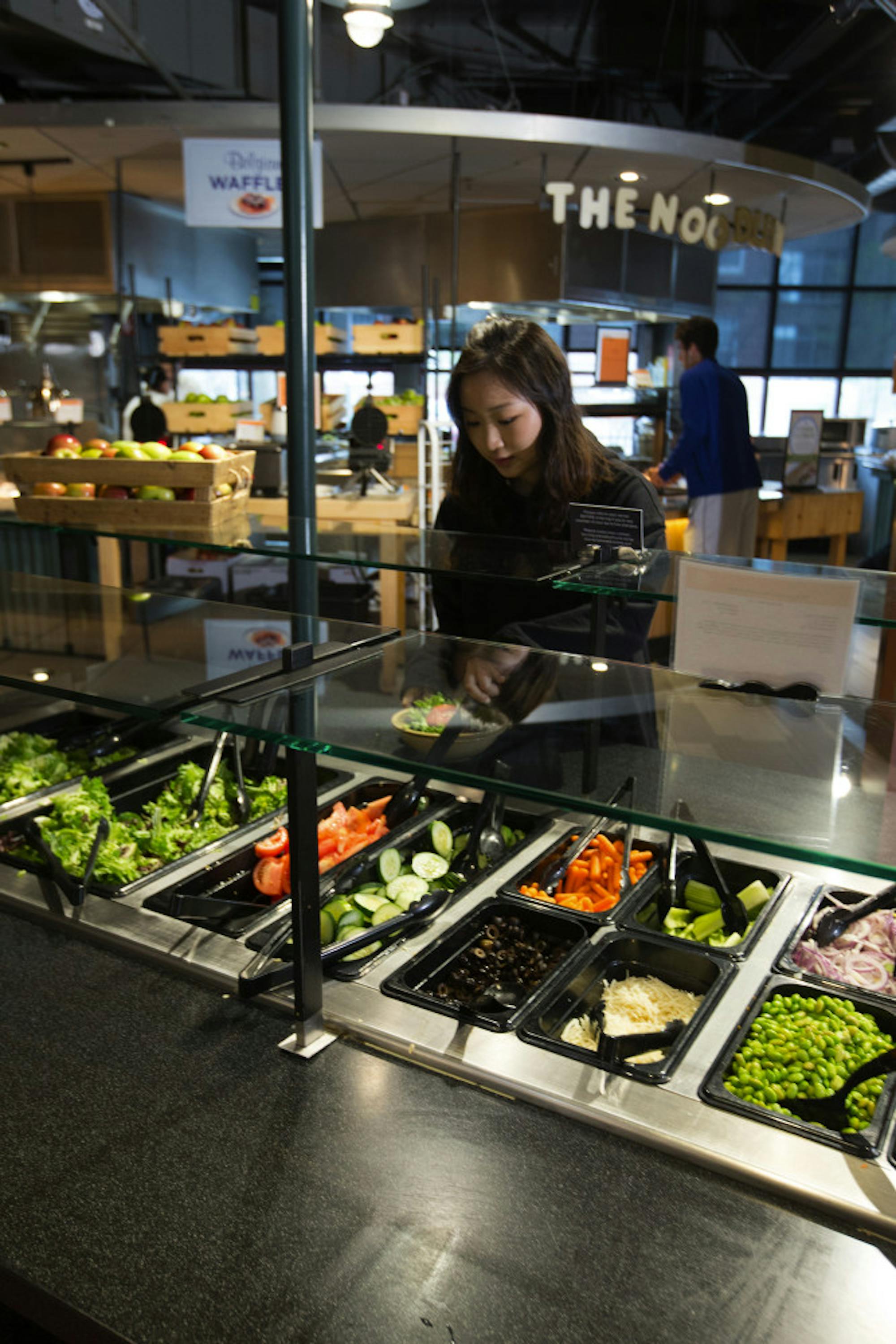The history of meatless meals in the United States can be traced back to World War I, when American families were asked to ration the scarce supply of meat. Today, a renaissance of meatless days has been framed in terms of environmental conservation. Public school districts in New York City, Baltimore and Los Angeles have declared Mondays to be meatless. Tufts, through the partnership of student Eco-Reps with Dining Services, has actively participated in Meatless Mondays.
Every Monday night, Tufts Eco-Reps stand near dining hall entrances to encourage students to choose to forgo their meat consumption for dinner that day or every Monday. Because meat dishes are still offered, for students, going meatless remains a voluntary choice.
"As students walk in, we try to encourage them to participate in a meatless dinner. We emphasize the importance of not pressuring anyone and treating Meatless Mondays as a great opportunity to make change," senior Eliza Hilfer, Eco-Reps assistant coordinator of special projects, said.
Alongside Hilfer's work as an Eco-Rep, she has shifted her own diet to be more environmentally conscious. She said that her lifestyle changes have been focused not only on reducing the amount of meat consumed, but also on eating meals with ethically sourced ingredients.
"Being an ethical consumer requires research to truly understand where everything comes from and how it is disposed, and that may be out of our hands," Hilfer said.
Eco-Reps Assistant Coordinator Taite Pierson came to Tufts having been vegetarian since elementary school. In the summer after fourth grade, Pierson said that she was motivated to eschew meat from her diet after seeing a scene from "Julie & Julia" (2009) where Meryl Streep, as chef Julia Child, stuffs a duck.
"The meat just looked so much like a real animal that had been alive. I declared at lunch after that I would no longer eat meat. Of course as I matured, I started getting interested in the sustainability side of being vegetarian, and I learned a lot more about the horrors of factory farming. What started with empathy for animals has definitely grown into a sense of responsibility for the environment," Pierson said.
Pierson added that her favorite plant-based dining hall dishes are thyme green beans and tofu sandwiches.
According to a recent poll conducted by Gallup,8% of Americans aged 18 to 34 identify as vegetarian. However, Kelly Shaw, a nutrition marketing specialist at Tufts, said that number is around 27% at Tufts, according to the 2018 Dining Survey. Part of the survey, distributed by Dining Services via email, allows the university to gauge how many students have religious, health or voluntary dietary restrictions.
"While not a large percentage of the total population, Tufts Dining takes the needs of these students seriously and ensures that there is a variety of vegan and vegetarian options on every menu," Shawtold the Daily in an email.
In 2016, Tufts Friedman School of Nutrition Science and Policy Associate Professor Christian Peters, along with a team of other scientists, found that a vegetarian diet that incorporated dairy products maximized the amount of people that could be fed. This limit, called the carrying capacity, peaked under a lacto-vegetarian diet while a vegan diet was concluded to have the second lowest carrying capacity of all of the diets.
"It is easy to get caught up in comparing the diets to one another, but a more relevant question is what dietary changes help to reduce our environmental impact. Each person who follows a vegan diet contributes to lowering the total population-wide consumption of meat. Bear in mind, however, that hunger and climate change are too multi-faceted to be solved by a single action – even one as dramatic as global veganism," Peters told the Daily in an email.
In addition to ensuring that there are a sufficient number of vegetarian and vegan dishes served on campus, Dining Services has also focused its effort on a more general priority to decrease its environmental impact.
"Tufts Dining follows the principles of the Menus of Change to create globally-inspired plant-forward menus that focus on beans, legumes, nuts and seeds as well as fruits and vegetables," Shaw told the Daily in an email.
In addition to partnering on Meatless Mondays, Eco-Reps and Dining Services have also led initiatives such as Scrape Your Plate, which encourages students to reduce their food waste. Although both dining halls already compost all food waste, bringing compost bins into the open and allowing students to scrape their own plate allow diners to visualize the aggregation of leftover food.
By spreading awareness of ecologically-friendly practices like composting, both the Eco-Reps and Dining Services promote sustainable eating.
"You can always come back for seconds and thirds in the dining centers, which is much better than having leftover food. With the Scrape Your Plate program, we emphasize that the food in the dining centers is always composted. However, leftover food that is not taken from the stations is turned into meals for members of the community who are food insecure, with the help of Tufts Food Rescue [Collaborative]," Hilfer said.
Ultimately, while initiatives like Meatless Mondays present the option to go meatless as a completely voluntary choice, the fact that slightly more than a quarter of Tufts students have gone meatless is a sign that the choice is accessible and easy.
"I'd say Tufts must do a pretty good job, because I know comparatively way more vegetarians and vegans here than I do at home," Pierson said.
Eco-Reps foster accessible vegetarianism through initiatives such as Meatless Mondays

A student picks up fresh vegetables from the Dewick-MacPhie Dining Center salad bar.





